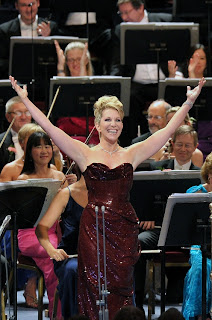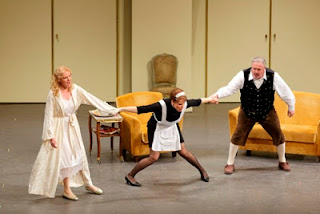If we’re talking about archetypal English afternoons, then I
can think of nothing much more perfect than lunch in an Oxford college, a walk
around the grounds in warm spring sunshine, and choral evensong in the college
chapel. To paraphrase unpoetically one of Oxford’s wisest graduates,
gentle reader, do not care to know/Where Russia
draws his* eastern bow,/What violence is done,/Nor ask what doubtful act allows/Our freedom in this English town,/Our dining in the sun.
Last Wednesday’s freedom came courtesy of Opus Arte promoting
Magdalen College Choir, starting with a CD of Buxtehude’s Membra Jesu nostri. So far I’ve only dipped, but the work is a very
quirky gem, celebratory or lamentatory according to what image or incident the
limb of each motet conjures up. If I’m to be honest, the evensong was a mixed
blessing. I like the bright, open sound the choir makes under Daniel Hyde, very
much in the James O’Donnell tradition of more robust, continental style as
opposed to the rather bloodless tones of our own cathedral tradition.
I’d
moaned to Philippa Howard, our cicerona, that I much prefer singing Byrd to
listening to his music, and had hoped for something Victorian and vulgar in the
service, but I’d forgotten what a masterpiece his Second Service is – or
rather, the ideas came back as fresh as the day we first sang them on an All
Saint’s Banstead cathedral course back in the 1970s. Yet in the anthem, Quomodo
cantabimus (which we never performed), I had the curious sensation that the choir was
singing ever so slightly sharp throughout – a much better fault than singing
flat, indicative of zeal rather than torpor, but disconcerting all the same.
The rest was unalloyed pleasure. Though arriving in Oxford on a late train, I
couldn’t resist speeding on foot along a favourite route from the station to Magdalen and was just in
time for lunch at the Lodgings of the President, Professor David Clary. This in itself was a privilege – thought
the building is nearly all Victorian, it has treasures such as the richly
detailed Flemish tapestry received by one of the early Presidents for his part in arranging the match between the ill-fated Arthur, brother of the future Henry VIII, and Catherine of Aragon; both were only 15 at the time of their wedding in St Paul's. The Cathedral claims that this detail, reproduced courtesy of the Master and Fellows of Magdalen College, represents the royal couple, though our Master's wife, who kindly gave us a tour, thought that was highly speculative.
Guests at table included former Magdalenians - if that's what they're called - John Mark Ainsley, with whom I was delighted to join in a paean to Richard Jones – JMA had just been singing in the stupendous ENO Rodelinda – and Robin Blaze, who sang from the same hymnbook on the glories of Göttingen.
I took myself off for a solitary look at the magical late 15th century cloister/quad, with its figures reproduced in the drawing of the White Witch’s stone statuary for Magdalen man C S Lewis’s The Lion, the Witch and the Wardrobe - last seen with the wisteria in bloom, but against greyish skies - and then headed across the lawn towards Holdsworth's virtually unadorned New Building of 1733
and in front of it the plane tree planted in 1802 to commemorate the Peace of Amiens (this and other much more curious facts to be found in Peter Sager's Oxford & Cambridge: An Uncommon History, which I'm reading from cover to cover, having loved his outsider's take on East Anglia).
The college’s eccentric possession of a deer herd was much
in evidence, horns being locked across the pastures. We stood, watched,
chatted, then went in to evensong via the ever-impressive pre-chapel, which has all the major treasures - the misericords which start with a man's head peering between a lady's thighs, Piper's animals-report-the-nativity charmer stained glass and the sepia grisaille west window of the Last Judgment, designed by a London goldsmith in 1632, removed before the Second World War and not replaced until 1996, a project funded by two Californian former students. Looking back on my last Magdalen entry, I see I've got almost the same picture, but never mind.
JMA told me the chapel resonates – the G spot, as it
were – to B major, for which Francis Jackson catered in the final ‘Amen’ of his canticles.
After the service I wove my way along the seclusion of New College Lane, skirting Magdalen and New until the back of All Souls came into view with Hawksmoor’s Gothic/Baroque twin towers in silhouette
then shining in the late afternoon sun from west of the Radcliffe Camera.
And the cherry blossom was in full glory in front of St Mary’s on the High Street.
So back to London
by 7pm to head for the Marylebone Hotel and talk to heavenly Anne Schwanewilms on Strauss, the role of whose Marschallin she
now truly owns. We had a full 95 minutes’
conversation, during which she left me in no doubt that she’s the funniest as
well as the wisest soprano I think I’ve ever had the pleasure of interviewing. Some of her comic mannerisms even reminded me of Carole Lombard, another beautiful woman with an earthy streak.
Photo below by Javier del Real.
A shame the impersonations of a certain conductor weren’t filmed as well as sound-recorded; I wonder how I’ll transcribe them for the Arts Desk Q&A, due to appear just before her Barbican concert appearance with Sarah Connolly, Lucy Crowe and Mark Elder conducting the LSO (Rosenkavalier excerpts only, alas, but don’t miss them). La Schwanewilms was here for another Wigmore recital, which I went to hear the following evening but didn't review simply because most of the programme was the same as the one I'd covered back in December 2011; even so, her spellbinding narrative skills proved hair-raising in Liszt's 'Die Loreley' and achingly sorrowful in Mahler's 'Wo die schönen Trompeten blasen'.
A shame the impersonations of a certain conductor weren’t filmed as well as sound-recorded; I wonder how I’ll transcribe them for the Arts Desk Q&A, due to appear just before her Barbican concert appearance with Sarah Connolly, Lucy Crowe and Mark Elder conducting the LSO (Rosenkavalier excerpts only, alas, but don’t miss them). La Schwanewilms was here for another Wigmore recital, which I went to hear the following evening but didn't review simply because most of the programme was the same as the one I'd covered back in December 2011; even so, her spellbinding narrative skills proved hair-raising in Liszt's 'Die Loreley' and achingly sorrowful in Mahler's 'Wo die schönen Trompeten blasen'.
Much on my mind at the time of the interview was Die Frau ohne Schatten, that extraordinarily
hard-to-stage fairy tale creation of Strauss and Hofmannsthal. Anne compared
the two productions in which she’d appeared as the Empress – central to
Christof Loy’s magic-free psychological study at Salzburg, which she bought
though some of her friends didn’t, and coping at the Met with sets so tricky that they
sent her to hospital on one occasion in the late Herbert Wernicke's resurrected show:
that yielded pretty pictures, she said, into which the singers had to fit as best they
could. She came a cropper several times on her mirrored glass slope, pictured below, and on one of those occasions had to make a visit to a New York hospital.
Claus Guth’s Royal Opera production, previously seen at La
Scala, strikes a miraculous halfway house between psychoanalytic probing and
the supernatural. I’ve waxed lyrical about it over on the Arts Desk and hope to
go again towards the end of the run. The cast is uniformly excellent, led by
Emily Magee’s sympathetic Empress (pictured below with father Keikobad in
another of CliveBarda’s excellent photos).
Communicating with the CBSO’s Richard Bratby about it, I thought
he hit the nail on the head when he remarked that he’d never realized what a
desperately sad opera it is – and that includes the apotheosis, which worked
for me here as never before. I even had a dream the same night about the court-room fantasy which is one
of its more extraordinary later tableaux.
As it happened, talks with two fascinating women framed the Oxford visit, making for an exceptional 24 hours. On the Tuesday evening
Sioned Williams, principal harpist of the BBC Symphony Orchestra and one of the
world’s great soloists, came to talk – and did she just – to my City Lit class
about the music she’s been commissioning for her 60th birthday year.
Such wisdom and passion here about the infinite variety of so-called ‘contemporary’ music, above all how you the artist have to find what you like and go with that, and by the same token the composer must know your own special skills and abilities (which of course is how Britten always worked). I was pleased to see Paul Patterson as one of Sioned’s invitees (her very friendly Iranian husband Ali Hosseinian, whose compatriots' music she continues to champion, was there to offer technical assistance, too).
Such wisdom and passion here about the infinite variety of so-called ‘contemporary’ music, above all how you the artist have to find what you like and go with that, and by the same token the composer must know your own special skills and abilities (which of course is how Britten always worked). I was pleased to see Paul Patterson as one of Sioned’s invitees (her very friendly Iranian husband Ali Hosseinian, whose compatriots' music she continues to champion, was there to offer technical assistance, too).
I wish I’d recorded it all – but Sioned, who had been ill
and thus wasn’t able to bring her harp this time, will be back in September
close to her special anniversary concerts. I’m relieved to say that her home
remortgaging to pay for the commissions will now be partly offset by a grant from the
Park Lane Group.
*I'm afraid Putin's lies and macho posturing have forfeited the feminine article of Mother Russia, but it was ever thus. The poem, of course, is my favourite, 'A Summer Night' by W H Auden.
*I'm afraid Putin's lies and macho posturing have forfeited the feminine article of Mother Russia, but it was ever thus. The poem, of course, is my favourite, 'A Summer Night' by W H Auden.



























































